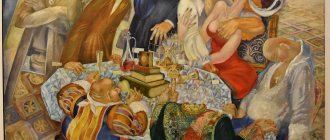What are the 7 virtues?
Christian 7 virtues - a list of good deeds or images of a person’s inner disposition that have a beneficial effect on his soul and bring it closer to God. Saint Tikhon of Zadonsk calls virtue “every word, deed and thought that is in accordance with the law of God” (“Fatherland”).
The list of “Seven Virtues” is not the only and final one. He cites only the most important qualities of a true Christian. There are many other classifications of virtues and their lists.
Virtue
Sins against one's neighbor
Lack of diligence in one's position or one's work in the dormitory. Disrespect for superiors or elders. Failure to fulfill a promise to a person. Non-payment of debts. Taking by force or secret appropriation of someone else's property. Stinginess in alms. Personal insult to one's neighbor. Gossip. Slander. Cursing others. Unnecessary suspicions. Failure to protect an innocent person or a just cause with loss for them. Murder. Disrespect for parents. Failure to look after children with Christian care. Anger is hostility in family or home life.
Sins and 7 virtues
Each Christian virtue is the opposite of certain sins and at the same time an “antidote” to them, a means of healing the soul from these sins. Thus, if a person knows his main sinful passions, then for spiritual cleansing and salvation he needs to focus on the corresponding virtues. It is also important to remember that all virtues are related to each other. Diligent execution of one of them will certainly attract many others into the soul. The Monk Paisius the Svyatogorets taught:
“If you decide to struggle against some passion and cultivate the opposite virtue not for five minutes, but for a long time, then you will achieve the fact that along with a specific defeated passion you will get rid of other passions. In addition, virtues that are opposite to these passions will develop in you” (“Passion and Virtues”).
For example, the passion of gluttony is opposed to the virtue of abstinence, fasting. If a Christian diligently abstains from excesses in food, his passion gradually weakens. The flesh not only ceases to enslave the will, but, on the contrary, becomes subordinate to it. It is easier for a person who is not satiated to resist many other passions, as well as to cultivate other virtues in his soul. For example, such a person will be more inclined to pray than someone whose stomach is full. Archpriest Andrei Tkachev notes:
“If they are together - fasting and prayer, then they, intertwined, will constantly support each other. When praying, a person does not feel the severity of abstinence so keenly. The burning of the praying spirit makes one forget about bodily needs.”
Sins against the Lord God
Belief in dreams, fortune telling, meetings and other signs. Doubts about faith. Laziness towards prayer and absent-mindedness during it. Not going to Church, long absence from confession and Holy Communion. Hypocrisy in Divine Worship. Blasphemy or just murmuring against God in the soul and in words. The intention to raise your hands. In vain. An unfulfilled promise to God. Blasphemy of the sacred. Anger with mention of evil spirits (trait). Eating or drinking on Sundays and holidays before the end of the Liturgy. Violation of fasts or inaccurate observance of them is a work issue on holidays.
1st virtue: Longsuffering
This virtue is expressed in persistently enduring hardships and sorrows, which are sent by God for our spiritual growth. A patient person always maintains peace of mind and does not get irritated with his neighbors.
With patience, a Christian overcomes the passions of anger, condemnation, resentment, enmity, and irascibility. Holy Scripture calls us:
“With patience save your souls” (Luke 21:19).
Let us also cite the instruction of St. John Chrysostom:
“When we endure evil, the devil becomes a captive and suffers evil, while he wants to do it to us... To be worthy to endure anything for the sake of Christ is the greatest grace, a perfect crown and a reward no less than the future reward!” (Complete collection of works).
Essential Qualities of Virtue
There is more than one list of virtues. categories that influence human morality, Immanuel Kant
A person's duty to himself, consisting of:
- self-preservation;
- truthfulness;
- self-esteem;
- conscience.
Duty to society includes:
- love for people;
- Gratitude;
- compassion;
- compassion;
- modesty;
- respectfulness.
7 virtues in Orthodoxy: list
In the Christian value system, virtue is one of the main concepts. Here are its main, but far from the only components:
- Longsuffering is steadfastness in enduring trials and the ability not to become irritated with others.
- Prayer is the ardent aspiration of the Christian soul to the Creator and communication with Him.
- Chastity - purity of body, beauty of spirit, moral integrity, resistance to temptation.
- Mercy and almsgiving are a manifestation of compassion for neighbors, selfless and selfless provision of material support to them.
- Self-control is the ability to keep your desires in check.
- Humility is the absence of arrogance, a sober assessment of one’s knowledge, abilities and qualities.
- Love is selfless and selfless service to others, based not on a sense of duty, but on recognizing them as God's creations, worthy of the same care and respect as we are.
Contrasting with sins
Virtue is opposed to vice. These are mortal sins that destroy the soul like poison. They deprive eternal life of those who follow the path of sin, unwilling to repent.
Each virtue is opposed to specific sins:
- humility - pride, thirsting for admiration;
- mercy - spiritual callousness, indifference to someone else's misfortune;
- chastity - fornication and debauchery;
- self-control - gluttony and anger;
- prayer - despondency and complacency;
- love - selfishness;
- long-suffering - irritability and pickiness towards the shortcomings of others.
Main Christian virtue
The basis of all other virtues is love for God and people. It's not just a feeling in the heart. We are talking about active, selfless concern for the good of others.
2nd virtue: Prayer
True Christianity is impossible without prayer - the ardent aspiration of the mind and heart to the Lord and the saints. A sincere appeal to God and the righteous will never go unanswered. The Lord said:
"Ask, and it shall be given you; seek and you will find; knock, and it will be opened to you” (Matthew 7:7).
According to St. Theodore of Edessa, in communion with God a person finds protection from evil, purification of the mind and consolation from sadness (“Philokalia”). Therefore, prayer is the best cure for such passions as despondency, despair, idleness, insensibility, laziness. The Holy Venerable John Climacus taught:
“Merely remaining in prayer is already an acquisition. What good is greater than this - to cleave to the Lord and remain unceasingly in union with Him” (“The Ladder”).
3rd virtue: Chastity
Chastity most often means purity and immaculateness of the flesh, virginity. However, this concept can also have a broader meaning - the spiritual beauty of a person, his moral integrity, perseverance in resisting temptations.
As we remember, sins and 7 virtues are opposites. What spiritual illnesses can be overcome by chastity? First of all, these are prodigal sins, as well as unclean thoughts and foul language. We should keep our souls and bodies pure, since they are designed for the indwelling of the Holy Spirit:
“Do you not know that you are the temple of God, and the Spirit of God dwells in you? If anyone destroys the temple of God, God will punish him, for the temple of God is holy; and this temple you are” (1 Cor. 3:16–17).
The Gospel tells us that fornicators, adulterers, adulterers and homosexuals commit abomination before God and will not find the Kingdom of Heaven (1 Cor. 6:9-10). Even mental depravity alienates a person from God and makes him a slave to base passions that lead to sinful actions. In this regard, Saint Ignatius (Brianchaninov) teaches that first of all it is necessary
“alienation of the mind from prodigal thoughts and dreams, and the heart from prodigal sensations and desires. This will be followed by the alienation of the body from carnal lust” (“Ascetic Experiences”).
4th virtue: Mercy and almsgiving
This virtue implies compassion for one’s neighbor, selfless provision of material or other assistance to him. Mercy destroys selfishness in a person, ennobles and pacifies his soul. The Lord calls us:
“Be merciful, just as your Father is merciful” (Luke 6:36).
Let us remember His other words:
“Blessed are the merciful, for they will obtain mercy” (Matthew 5:7).
Saint John Chrysostom teaches:
“Alms are the queen of virtues, very quickly elevating people to the vaults of Heaven, the best protector” (Complete Collection of Creations, volume 2).
This virtue is an effective spiritual weapon in overcoming the love of money, greed, greed, and callousness towards one’s neighbor. However, Saint John adds:
“If you give away even thousands of talents (coins), with pride, arrogance and vanity, you will destroy everything, just as the Pharisee, who gave a tenth of his property, but was arrogant and arrogant about it, left the temple, having destroyed everything "(Complete Works, Volume 3).
Mortal sins, that is, those that make a person guilty of eternal death or destruction
1. Pride, despising everyone, demanding servility from others, ready to ascend to heaven and become like the Most High: in a word - pride to the point of self-adoration.
2. An insatiable soul, or Judas’s greed for money, combined for the most part with unrighteous acquisitions, not allowing a person even a minute to think about spiritual things.
3. Fornication, or the dissolute life of the prodigal son, who squandered all his father’s estate on such a life.
4. Envy, leading to every possible crime against one’s neighbor.
5. Gluttony or carnal knowledge, not knowing any fasting, combined with a passionate attachment to various amusements, following the example of the Evangelical rich man, who had fun all day long.
6. Uncompromising anger and resolving to terrible destruction, following the example of Herod, who in his anger beat the Bethlehem babies.
7. Laziness, or complete carelessness about the soul, carelessness about repentance until the last days of life, such as in the days of Noah.
5th virtue: Temperance
Temperance is the ability to control one’s own desires. Man has both natural needs (for example, food) and passions perverted by sin. The latter must be fought mercilessly, while satisfying the former requires reasonable measures. Without it, even a natural need can develop into a terrible sinful passion that enslaves a person’s will. Thus, excesses in food lead to the passion of gluttony, drunkenness, etc. Priest Georgy Maximov notes:
“An intemperate person experiences a clouding of his mind, his memory and all abilities become dull, he becomes hot-tempered, irritable, cannot control himself, and becomes a slave to his passion.”
The virtue of abstinence strengthens a person's will and frees him from sinful addictions. One of the means of cultivating abstinence is fasting, which curbs the flesh and thoughts, making them an instrument for fulfilling God's commandments. Let us quote the teaching of St. John Chrysostom:
“He who believes that fasting only means abstaining from food is mistaken. True fasting is avoiding evil, curbing the tongue, putting aside anger, taming lusts, stopping slander and lies” (Creations).
From the compiler
It is generally accepted that the phrase “mortal sin” goes back to one of the books of the New Testament - the First Epistle of John, in which we find:
“If anyone sees his brother sinning a sin that does not lead to death, let him pray, and God
will give him life,
that is,
he who sins
sin
does not lead to death. There is a sin leading to death: I do not mean that he should pray” (5, 16–17). In other words, for the author the division of sins into “mortal” and “immortal” is so obvious that he does not even name them.
In the Bible you can find mention of only one “unforgivable” sin: “... every sin and blasphemy will be forgiven to men, but blasphemy against the Spirit will not be forgiven to men; if anyone speaks a word against the Son of Man, it will be forgiven him; But if anyone speaks against the Holy Spirit, it will not be forgiven him, either in this age or in the next” (Gospel of Matthew, 12, 31-32). However, in the same text we also find the following warning: “If you forgive people their sins, your Heavenly Father will also forgive you, but if you do not forgive people their sins, then your Father will not forgive you your sins” (6, 14 -15). That is, any sin can become mortal if the person committing it does not forgive people for their sins.
On the other hand, in the book of Proverbs (Old Testament), Solomon lists seven “abominations” that the Lord hates: “These are six that the Lord hates, even seven, which are an abomination to His soul: proud eyes, a lying tongue, and hands that shed innocent blood, a heart that forges evil plans, feet that quickly run to evil, a false witness who speaks lies and sows discord among brothers” (6, 16-19). There are no other indications of mortal sins and their number in the Bible.
The concept of the “Seven Deadly Sins” itself is not part of Christian doctrine, but is only an attempt to build a hierarchy of human sins. Select the most terrible ones, that is, those that lead to the violation of any of the Ten Commandments or cause other sinful acts, ultimately leading to the fact that the soul of the person who commits them ends up in hell after the Last Judgment.
This concept has been formed over the centuries and partly continues to develop today. The first attempts to identify the most terrible sins are found in the works of Catholic priests starting from the 4th century. Such sins included the following: anger, pride, envy, laziness, stinginess, voluptuousness, gluttony
, - and sometimes also:
theft, blasphemy, unbelief, slander, oppression of the wretched and defenseless, wastefulness, jealousy, premeditated murder
, as well as
excessive reliance on God’s mercy
and some others.
At the same time, the Greek mystic theologian Eugarius of Pontus (345–399) created a doctrine according to which, in order to achieve the transition to the illumination of the mind (gnostic life), the other side of life, the practical, must include the cleansing of the soul from 8 such passions and thoughts, as: fornication, anger, pride, sadness, love of money, vanity, despondency, gluttony
.
In 553, at the 5th Ecumenical Council, the teachings of Eugarius were condemned and recognized as heretical. However, the names of the passions and thoughts themselves were translated from Greek into Latin and were used in Catholic prayers to designate the 7 most terrible sins: Greed
(love of money),
fornication, anger, pride
(pride),
gluttony
(gluttony),
despair
(sadness and despondency ),
vanity
.
In 590, Pope Gregory the Great “corrected” this list, replacing despair
with
despondency, fornication
with
lust
, and also combined
vanity
with
pride
and added
envy
.
It was in this form that this list found its way into the works of Thomas Aquinas (c. 1225–1274), after which the concept of the seven deadly sins became widespread not only in theology, but also in philosophy, literature and art. And in the XIV century. the so-called mnemonic rule SALIGIA was created - an abbreviation made up of the first letters of the Latin names of sins: Superbia (pride); Avaritia (greed); Luxuria (lust); Invidia (envy); Gula (gluttony); Ira (anger); Acedia (despondency).
In the Orthodox tradition, mortal sin is understood as any sin for which a person does not consciously repent. Nevertheless, there is a concept of 8 sinful passions, consistently presented in the work of Bishop Ignatius Brianchaninov (1807–1867) “The Eight Main Passions with Their Divisions and Branches.” Such passions include: anger, pride, sadness, adultery, love of money, vanity, despondency, gluttony
.
Along with the concept of the seven deadly sins, Christianity has also developed a tradition of contrasting these sins with basic virtues that allow people to use their capabilities and abilities only for good. Thus, Thomas Aquinas, mentioned above, in his work “Summa Theologica”, identified three theological virtues - faith, hope, love
, and four cardinal or fundamental ones -
prudence, justice, courage, moderation
.
Subsequently, the Catholic Church revised this series and settled on the following: meekness, love, humility, patience, moderation, zeal, chastity
, - and the Orthodox Church offers its own, slightly different list:
abstinence, meekness, love, non-covetousness, humility, sobriety, chastity
.
But, apparently, man is structured in such a way that, even wanting to achieve perfection, eradicate evil and preserve his immortal soul, he focuses all his attention not on virtues, but on sins, probably believing that fighting sins is more important than follow virtues.
The theme of mortal sins has inspired many. World famous artists (Giotto, Bosch, Bruegel, Callot, Titian), writers (Dante Alighieri, S. de Coster, E. Ionesco, M. Pavic), theater and film directors (B. Brecht, E. De Filippo, R. Rossellini C. Chabrol, J.-L. Godard, R. Vadim, D. Fincher), sculptors, photographers, philosophers and many, many others.
Not long ago, one of the Catholic bishops, the head of the Apostolic Penitentiary, Monsignor G. Girotti, in an interview with the Vatican newspaper “L'Osservatore Romano” (03/9/2008), speaking about the change in the modern world in the external manifestation of “deadly sins”, officially stated: “Genetic manipulation , environmental pollution, unequal distribution of public goods, social inequality - these are new forms of sin that have appeared on the horizon of humanity, as an inevitable consequence of the process of globalization.”
Indeed, it is with bitterness that we have to admit that for our contemporaries, the “seven deadly sins” have long ceased to be just a Christian concept and have become attributes of the world in which we live and which seems to have forgotten about the existence of virtue. To verify this, just turn on the TV...
Of course, this situation cannot but worry, and I would like to hope that it worries many, regardless of religion, place of residence, age or gender.
This book presents aphorisms and statements of thinkers and philosophers, famous scientists and public figures, writers and musicians, artists and actors, who, as it seems to the compilers, were not indifferent. I would like to hope that their thoughts will help us understand the essence of each of the seven deadly sins and be convinced of the need to observe the seven main virtues.
Bruegel P.
Envy (
fragment)
6th virtue: Humility
Humility lies in a sober assessment of one's spiritual state. This is an admission of oneself as a sinner, who, in order to be saved, must step over one’s own pride and trust in the will of the Lord. The more a person humbles himself, the more his own sinfulness is revealed to him. At the same time, humility strengthens the repentant sinner in his trust in God. Rev. Nikita Stifat teaches:
“Humility is something greatest in virtues; for in whom it takes root through sincere repentance and takes prayer with abstinence as a companion, it immediately makes them free from passions, peace gives them strength, cleanses the heart with tears and fills it with silence in the invasion of the Spirit” (Creations).
The Gospel teaches us:
“God resists the proud, but gives grace to the humble” (James 4:6).
Humility overcomes pride (the stronghold of all sins), arrogance, self-will, murmuring, envy, deceit, self-justification and hypocrisy. In humility, a person’s faith and love for God and neighbors are strengthened. With this virtue, a repentant sinner opens his heart to Divine grace, sanctifies and transforms his life.
7th virtue: Love
There is no higher virtue in Orthodoxy than love. It is the main property of God Himself:
"God is love. He who abides in love abides in God, and God in him” (1 John 4:16).
Love conquers all evil and enmity. This virtue, according to the expression of Saint Ignatius (Brianchaninov), is a gift of the Lord, poured into the souls of His true servants by the action of the Holy Spirit (“Ascetic Experiences”). Love for God and neighbor - the entire Divine Law can be reduced to these two commandments (Matthew 22:37-39). Without love, all other Christian virtues lose meaning:
“If I have the gift of prophecy, and know all mysteries, and have all knowledge and all faith, so that I could move mountains, but do not have love, then I am nothing. And if I give away all my goods and give my body to be burned, but do not have love, it profits me nothing” (1 Cor. 13:2-3).
At the same time, we must not forget that genuine Christian love is active (i.e., actively expressed by deeds, actions) and sacrificial (selflessly serves one’s neighbor, shows self-sacrifice). It should extend even to enemies (Matthew 5:44), because in every person there is a particle of God’s image. Priest Georgy Maximov notes:
“The Lord Jesus Christ came to earth and accepted death to open the path of salvation for every person, which means that He shed His Blood for him as well as for us. This alone is enough to love someone who offends us, being sick with sin and blinded by the devil.”
Brief Definition
Virtue is the thoughts and actions of a person nurtured by faith, which are characterized by holiness , justice, righteousness and honesty. According to Scripture, virtuous qualities are Christian qualities, collectively called the fruit of the Holy Spirit . That is, this is not ordinary integrity, characteristic of many people, including non-believers. It is about striving for an ideal state of harmony, perfection, truth and satisfaction from an ethical point of view, which is only achievable with the help of our Heavenly Father.
Interesting fact
Saint
Tikhon of Zadonsk called virtue any action, thought or word that is consistent with the Law of God.
Synonyms and antonyms
Main synonyms of the word:
- righteousness;
- moral;
- honesty;
- nobility.
Basic antonyms:
- vice;
- wickedness;
- cynicism;
- crime.
Concept in philosophy
Philosophers have been interested in virtue since ancient times. In their works they said that a person is not born virtuous, but becomes a result of upbringing and self-education. In this case, the rebirth of a person as a person occurs.
An outstanding concept of virtue was proposed by Immanuel Kant . He spoke of it as moral firmness in the performance of duty. It needs to be constantly reinforced with the right thoughts and decisions. At the same time, Kant did not consider virtue to be moderation between two vices, categorically disagreeing with Aristotle. One of the main achievements of his thought was the doctrine of the categorical imperative. According to him, we need to be guided by those principles that we consider binding on everyone. We are talking about the highest universal law.
Socrates: “Virtue is knowledge”
Socrates was very concerned about the relationship between knowledge and virtue. Unlike many, he believed that a person can be controlled not only by passion, but also by knowledge. Anyone who has learned the truth about good and evil, according to Socrates, will not voluntarily indulge in vice, because virtue is a direct and natural consequence of wisdom. Ethical knowledge embraces all aspects of human activity and is the golden key that opens the door leading to true happiness and prosperity.
Images of pagan thinkers and writers - frescoes from the dining room in the Bachkovo Monastery (Bulgaria) On Plato’s scroll it is written: “God has always existed, exists and will exist, as he has no beginning and will have no end.” From Socrates: “And he will receive flesh from the Jewish virgins and will be crucified. And blessed are those who listen to him. . "
Socrates could not imagine that one who possesses the truth about good and evil could choose short-term pleasure, knowing that in the end it will lead to incredible suffering.
In addition, the philosopher believed that with knowledge of true good there arises a desire to create it. After all, evil is unnatural for humans.
Aristotle's Doctrine of Virtue (briefly)
Aristotle his ethical teaching in an essay called Nicomachean Ethics. In it, he says that real ethics is not equal only to knowledge of the norms of goodness, because in addition to reason, a person also has strong feelings that can prevail over the activity of reason and encourage bad actions.
To achieve virtue, we need not only theoretical knowledge, but also exercises of the soul, through which goodness becomes a habitual and permanent property of our will, an integral trait of character.
The main feature of Aristotelian ethics is the doctrine that one must maintain a mean between extremes. For example, generosity is the middle ground between vanity and cowardice, and courage is between cowardice and reckless courage.
Aristotle's teaching on virtues. Table
Aristotle believed that the greatest good is not pleasure, but happiness based on obedience to the norms of virtue. Only those whose conscience is clear can be truly happy.
Virtue is in our power, just like vice, for we have the power to act in all those cases in which we have the power to refrain from action.
Aristotle
Virtues of the Stoics (overview)
The founder of Stoicism was the philosopher Zeno . He was the first of the Greek thinkers to express the conviction that the main goal of human existence is obedience to virtue. Zeno equated this to living in harmony with nature.
He tried to combine logic, physics and ethics into a single whole. The Stoics believed that philosophy is like the human body, in which logic is the skeleton, physics the soul, and ethics the muscles. The Stoics considered wisdom, courage, moderation and justice to be the main virtues.











